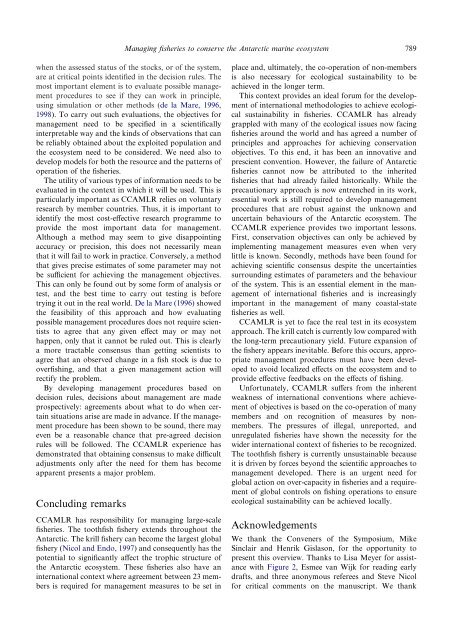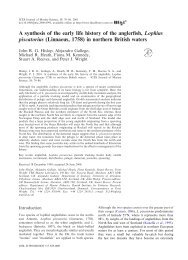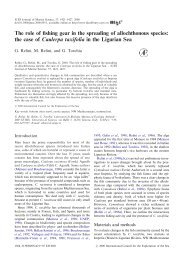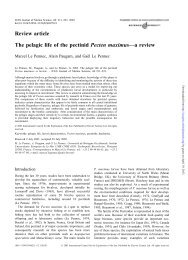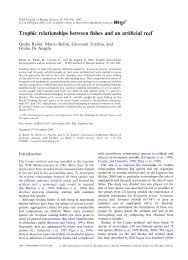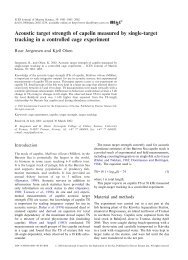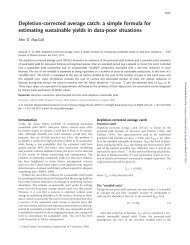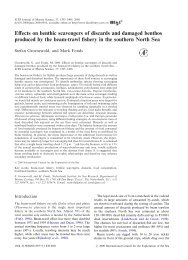Managing fisheries to conserve the Antarctic marine ecosystem ...
Managing fisheries to conserve the Antarctic marine ecosystem ...
Managing fisheries to conserve the Antarctic marine ecosystem ...
You also want an ePaper? Increase the reach of your titles
YUMPU automatically turns print PDFs into web optimized ePapers that Google loves.
<strong>Managing</strong> <strong>fisheries</strong> <strong>to</strong> <strong>conserve</strong> <strong>the</strong> <strong>Antarctic</strong> <strong>marine</strong> <strong>ecosystem</strong><br />
789<br />
when <strong>the</strong> assessed status of <strong>the</strong> s<strong>to</strong>cks, or of <strong>the</strong> system,<br />
are at critical points identified in <strong>the</strong> decision rules. The<br />
most important element is <strong>to</strong> evaluate possible management<br />
procedures <strong>to</strong> see if <strong>the</strong>y can work in principle,<br />
using simulation or o<strong>the</strong>r methods (de la Mare, 1996,<br />
1998). To carry out such evaluations, <strong>the</strong> objectives for<br />
management need <strong>to</strong> be specified in a scientifically<br />
interpretable way and <strong>the</strong> kinds of observations that can<br />
be reliably obtained about <strong>the</strong> exploited population and<br />
<strong>the</strong> <strong>ecosystem</strong> need <strong>to</strong> be considered. We need also <strong>to</strong><br />
develop models for both <strong>the</strong> resource and <strong>the</strong> patterns of<br />
operation of <strong>the</strong> <strong>fisheries</strong>.<br />
The utility of various types of information needs <strong>to</strong> be<br />
evaluated in <strong>the</strong> context in which it will be used. This is<br />
particularly important as CCAMLR relies on voluntary<br />
research by member countries. Thus, it is important <strong>to</strong><br />
identify <strong>the</strong> most cost-effective research programme <strong>to</strong><br />
provide <strong>the</strong> most important data for management.<br />
Although a method may seem <strong>to</strong> give disappointing<br />
accuracy or precision, this does not necessarily mean<br />
that it will fail <strong>to</strong> work in practice. Conversely, a method<br />
that gives precise estimates of some parameter may not<br />
be sufficient for achieving <strong>the</strong> management objectives.<br />
This can only be found out by some form of analysis or<br />
test, and <strong>the</strong> best time <strong>to</strong> carry out testing is before<br />
trying it out in <strong>the</strong> real world. De la Mare (1996) showed<br />
<strong>the</strong> feasibility of this approach and how evaluating<br />
possible management procedures does not require scientists<br />
<strong>to</strong> agree that any given effect may or may not<br />
happen, only that it cannot be ruled out. This is clearly<br />
a more tractable consensus than getting scientists <strong>to</strong><br />
agree that an observed change in a fish s<strong>to</strong>ck is due <strong>to</strong><br />
overfishing, and that a given management action will<br />
rectify <strong>the</strong> problem.<br />
By developing management procedures based on<br />
decision rules, decisions about management are made<br />
prospectively: agreements about what <strong>to</strong> do when certain<br />
situations arise are made in advance. If <strong>the</strong> management<br />
procedure has been shown <strong>to</strong> be sound, <strong>the</strong>re may<br />
even be a reasonable chance that pre-agreed decision<br />
rules will be followed. The CCAMLR experience has<br />
demonstrated that obtaining consensus <strong>to</strong> make difficult<br />
adjustments only after <strong>the</strong> need for <strong>the</strong>m has become<br />
apparent presents a major problem.<br />
Concluding remarks<br />
CCAMLR has responsibility for managing large-scale<br />
<strong>fisheries</strong>. The <strong>to</strong>othfish fishery extends throughout <strong>the</strong><br />
<strong>Antarctic</strong>. The krill fishery can become <strong>the</strong> largest global<br />
fishery (Nicol and Endo, 1997) and consequently has <strong>the</strong><br />
potential <strong>to</strong> significantly affect <strong>the</strong> trophic structure of<br />
<strong>the</strong> <strong>Antarctic</strong> <strong>ecosystem</strong>. These <strong>fisheries</strong> also have an<br />
international context where agreement between 23 members<br />
is required for management measures <strong>to</strong> be set in<br />
place and, ultimately, <strong>the</strong> co-operation of non-members<br />
is also necessary for ecological sustainability <strong>to</strong> be<br />
achieved in <strong>the</strong> longer term.<br />
This context provides an ideal forum for <strong>the</strong> development<br />
of international methodologies <strong>to</strong> achieve ecological<br />
sustainability in <strong>fisheries</strong>. CCAMLR has already<br />
grappled with many of <strong>the</strong> ecological issues now facing<br />
<strong>fisheries</strong> around <strong>the</strong> world and has agreed a number of<br />
principles and approaches for achieving conservation<br />
objectives. To this end, it has been an innovative and<br />
prescient convention. However, <strong>the</strong> failure of <strong>Antarctic</strong><br />
<strong>fisheries</strong> cannot now be attributed <strong>to</strong> <strong>the</strong> inherited<br />
<strong>fisheries</strong> that had already failed his<strong>to</strong>rically. While <strong>the</strong><br />
precautionary approach is now entrenched in its work,<br />
essential work is still required <strong>to</strong> develop management<br />
procedures that are robust against <strong>the</strong> unknown and<br />
uncertain behaviours of <strong>the</strong> <strong>Antarctic</strong> <strong>ecosystem</strong>. The<br />
CCAMLR experience provides two important lessons.<br />
First, conservation objectives can only be achieved by<br />
implementing management measures even when very<br />
little is known. Secondly, methods have been found for<br />
achieving scientific consensus despite <strong>the</strong> uncertainties<br />
surrounding estimates of parameters and <strong>the</strong> behaviour<br />
of <strong>the</strong> system. This is an essential element in <strong>the</strong> management<br />
of international <strong>fisheries</strong> and is increasingly<br />
important in <strong>the</strong> management of many coastal-state<br />
<strong>fisheries</strong> as well.<br />
CCAMLR is yet <strong>to</strong> face <strong>the</strong> real test in its <strong>ecosystem</strong><br />
approach. The krill catch is currently low compared with<br />
<strong>the</strong> long-term precautionary yield. Future expansion of<br />
<strong>the</strong> fishery appears inevitable. Before this occurs, appropriate<br />
management procedures must have been developed<br />
<strong>to</strong> avoid localized effects on <strong>the</strong> <strong>ecosystem</strong> and <strong>to</strong><br />
provide effective feedbacks on <strong>the</strong> effects of fishing.<br />
Unfortunately, CCAMLR suffers from <strong>the</strong> inherent<br />
weakness of international conventions where achievement<br />
of objectives is based on <strong>the</strong> co-operation of many<br />
members and on recognition of measures by nonmembers.<br />
The pressures of illegal, unreported, and<br />
unregulated <strong>fisheries</strong> have shown <strong>the</strong> necessity for <strong>the</strong><br />
wider international context of <strong>fisheries</strong> <strong>to</strong> be recognized.<br />
The <strong>to</strong>othfish fishery is currently unsustainable because<br />
it is driven by forces beyond <strong>the</strong> scientific approaches <strong>to</strong><br />
management developed. There is an urgent need for<br />
global action on over-capacity in <strong>fisheries</strong> and a requirement<br />
of global controls on fishing operations <strong>to</strong> ensure<br />
ecological sustainability can be achieved locally.<br />
Acknowledgements<br />
We thank <strong>the</strong> Conveners of <strong>the</strong> Symposium, Mike<br />
Sinclair and Henrik Gislason, for <strong>the</strong> opportunity <strong>to</strong><br />
present this overview. Thanks <strong>to</strong> Lisa Meyer for assistance<br />
with Figure 2, Esmee van Wijk for reading early<br />
drafts, and three anonymous referees and Steve Nicol<br />
for critical comments on <strong>the</strong> manuscript. We thank


